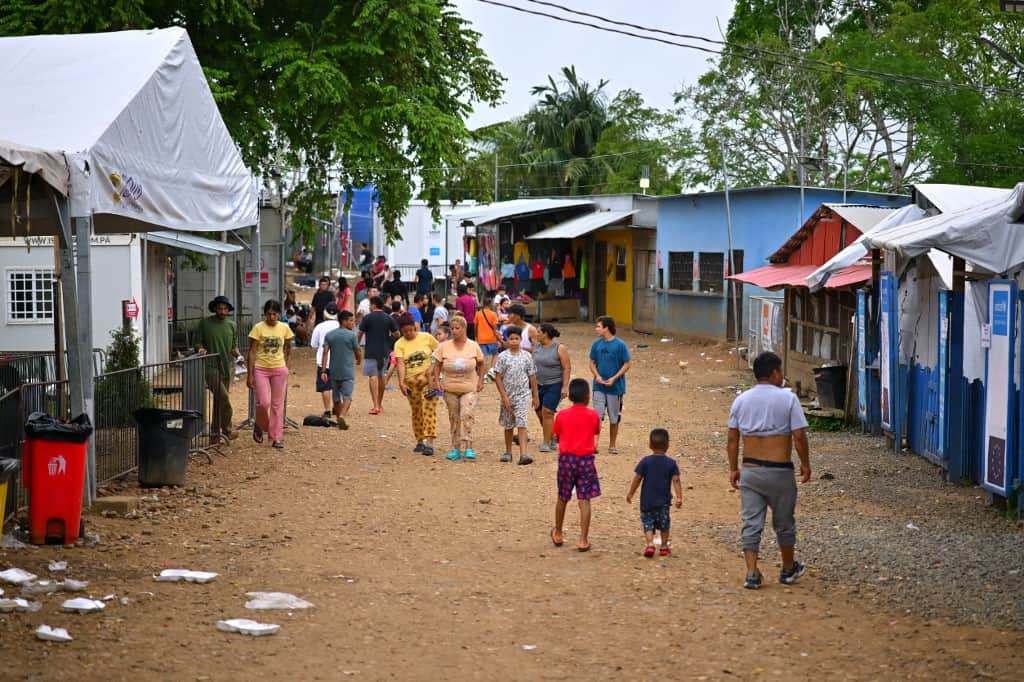“We have no money”: 65 migrants deported from the United States in February, mostly Asians, are desperately searching in Panama’s capital for a country that will take them in within three months.They are part of a group of 112 migrants, of the 299 sent to Panama by Donald Trump’s government, authorized to temporarily leave the shelter where they had been confined for two weeks in the jungle province of Darién, bordering Colombia.
After a five-hour bus journey, these people were left to fend for themselves after arriving at the Albrook bus terminal in the capital on Saturday night. Only a handful of migrants with children were provided a hotel in Panama City for a week by UNICEF, according to what they told journalists.
The rest must find their own accommodation and food in the Panamanian capital, although many have no money. Meanwhile, they must make arrangements to find a country that will receive them. “We have no money,” says Afghan Hayatullah Omagh in English at the terminal, near a former US air base in the disappeared Canal Zone.
“I asked the IOM (International Organization for Migration), the IOM told me ‘we don’t know, you go to Panama City and after that you are responsible for yourself,'” he adds. A 33-year-old Iranian, traveling with two children, shows an American bill and tells journalists: “I have no money, just one dollar.”
Until last year, thousands of migrants crossed the Darién jungle, on the border between Colombia and Panama, on their march northward. But now, with Trump’s deportation policy, most migrants in Panama and other Central American nations are making the reverse journey to South America.
If They Don’t Leave, They Will Be Expelled
On Friday, the Panamanian government announced a 30-day permit, which can be extended to a maximum of 90 days, for the 112 migrants to leave the San Vicente shelter to process visas to other countries. The permit was announced following criticism from human rights organizations, which claimed that San Vicente and the Catem migrant refuge in Costa Rica were “detention centers” rather than shelters.
“The commitment is voluntary return under their own resources to their country of origin or to a third country that wants to receive them,” explained Security Minister Frank Ábrego. However, Ábrego warned that “if in 90 days they have not left the country, they will be expelled or deported.”
They include 24 migrants from Iran, 21 from Cameroon, 12 from China, 10 from Nepal, 9 from Afghanistan, 7 from Vietnam, 6 from Ethiopia, 6 from Uzbekistan, 5 from Nigeria, 2 from Eritrea, 2 from Pakistan, 2 from Somalia, 2 from Ghana, 2 from Russia, 1 from Angola, and 1 from Sri Lanka.
Upon arrival from the United States, they were housed for a few days in a hotel in the Panamanian capital, where some displayed signs in the windows asking for help and warning that they were at risk of being returned to their countries of origin.
Fear of Punishment in Iran
“I have no information about where I should wait or sleep, because suddenly we all arrived here [in the Panamanian capital], without money, without information, so the situation is really bad,” says Iranian Artemis Ghasemzadeh. This convert to Christianity fled Iran but ran into the deportation policy of the Trump administration. Her case was reported in February by the American newspaper The New York Times.
When journalists ask her why she doesn’t want to return to Iran, Ghasemzadeh responds: “Because of my religion and also because I have problems with the hijab [Islamic veil],” adding that changing religion is punished in her country. An 18-year-old Iranian who identified herself only as Hanna says she does not intend to seek asylum in Panama because “it is not the right place for me.”
“I have to talk to my lawyer [in the United States] because he made the decision to do this, but I believe the UN is with us and the IOM is with us,” she adds.






